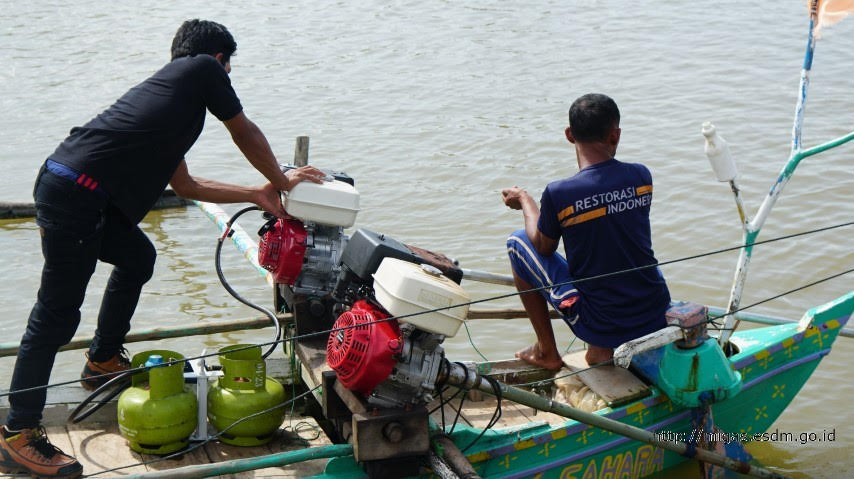Popular Reads
Top Results
Can't find what you're looking for?
View all search resultsPopular Reads
Top Results
Can't find what you're looking for?
View all search resultsEnergy ministry’s budget cut by a third to Rp 6.2 trillion
The largest cut is slated for oil and gas programs at 55 percent, lower than initially planned.
Change text size
Gift Premium Articles
to Anyone
T
he Energy and Mineral Resources Ministry is cutting back on program funding after its annual budget was slashed by more than a third to Rp 6.2 trillion from Rp 9.7 trillion as the government diverts funds for COVID-19 containment.
The largest cut is slated for oil and gas programs at 52 percent, lower than initially planned. This is followed by renewable energy programs (45 percent), geology programs (36 percent) and internal programs (15 percent). Some of the programs will be continued next year, according to ministry data released on Thursday.
“[The budget cuts] support the financial needs to tackle COVID-19 and help the economy recover,” said Energy Minister Arifin Tasrif on June 23, which was the first of a three-day hearing with lawmakers in Jakarta.
Indonesia has so far budgeted Rp 695.2 trillion to tackle the COVID-19 epidemic, which has claimed 2,573 lives as of Wednesday, the highest death toll in Southeast Asia, official data shows.
Read also: Indonesia increases COVID-19 budget again amid soaring deficit
However, the cuts carry repercussions for the programs’ intended recipients, many of whom include Indonesia’s poor, said House of Representatives members and industry groups.
The House pressured the ministry into diverting more funds to execute solar-powered street lighting (PJUTS), water well drilling, fishermen and farmer fuel-converter distribution programs, all of which were to be slashed by a greater degree before the hearings.
Oil and gas programs
Ministry data from Thursday's hearing shows that planned cuts in oil and gas programs are led by a 37 percent cut to farmers’ gas-to-fuel converter program and a 52 percent cut for the household gas pipe program.
Such kits convert subsidized cooking gas (LPG) into a fuel for gas-fired engines, whether a fisherman’s boat engine or a farmer’s water irrigation pump. Using the gas reportedly cuts fuel expenses by around 30 percent.
“Convertors are important in that it deals with fuel,” Indonesian Fishermen’s Association (HNSI) secretary-general, Anton Leonard, told The Jakarta Post. “If possible, do not make a cut now when fishermen are struggling to fish.”
He added that fuel costs contributed between 40 and 50 percent of a ship’s total operational costs, depending on vehicle size.
The gas pipe program, meanwhile, was slated to distribute gas pipe connectors to 266,000 households, mostly for towns in Sumatra and Java. Such piped gas is cheaper per unit volume than LPG canisters.
“Fishermen’s convertor kits are meant to provide a boost for their economic growth. Household gas pipes as well, many poor people live in cities,” said Golkar Party lawmaker and former governor Alex Noerdin.
Indonesia’s largest gas distributor, Perusahaan Gas Negara (PGN) , was not available for comment.
Renewables program
Green technology budget cuts were led by those in solar panel-related programs, such as solar-powered street lights and solar rooftop installations for public buildings, including government offices and houses of worship.
Government funding is a lifeline for the nascent domestic solar PV industry, which receives 70 percent of its business through state programs, an Indonesian Solar Panel Producers Association (APAMSI) previously told the Post.
“That automatically means that a shift in spending will add to the burden on solar producers,” said APAMSI chairman Nick Nurrachman.
Read also: Demand for photovoltaic panels plummets in Indonesia amid pandemic
However, ministry data also shows that Rp 109 million was allocated to complete several unfinished renewable energy programs from last year.
Programs include installing a mini hydropower plant (PLTMH) in Oksibil, Papua, and 13 biogas digesters, which process organic waste, such as human feces into cooking gas, in neighborhoods around the country.
Internal programs
The ministry plans to cut 15 percent from its budget for internal programs, which is the most modest cut among the four categories.
“We recommend diverting work trips and meeting package funds for infrastructure programs and imposing efficiency measures for work trips and meetings,” said ministry secretary-general Ego Syahrial during Wednesday’s hearing.
His side will not cut salaries and operational costs such as utilities and office supplies.
Geological programs
Budget cuts to the ministry’s geology body were led by a 48 percent cut for volcanic observatories and a 37 percent cut for well drilling in remote communities.
Former head of the Geology Agency, Rudi Suhendar, who retired a month ago, told the Post that the agency had completed the program bids before COVID-19 struck.
“Aside from Jakarta, we were going to drill wells in almost every province,” he said.
Lawmaker Ridwan Hisjam, also a Golkar politician, said the well drilling was particularly needed to support the Public Works and Housing Ministry, which was building water infrastructure as per the recently passed 2019 Water Law.
“This program has to keep on going. Do not change them; programs that are pro-people, that are in the people’s interest,” he said.










